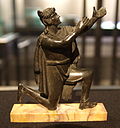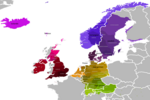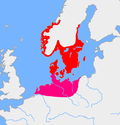South Germanic is a term used for a number of proposed groupings of the Germanic tribes or dialects. However, it is not widely used and has no agreed definition... 5 KB (567 words) - 22:57, 11 January 2024 |
Continental Germanic mythology formed an element within Germanic paganism as practiced in parts of Central Europe occupied by Germanic peoples up to and... 3 KB (287 words) - 22:09, 14 December 2022 |
Proto-Germanic paganism was the beliefs of the speakers of Proto-Germanic and includes topics such as the Germanic mythology, legendry, and folk beliefs... 72 KB (1,709 words) - 02:57, 14 December 2023 |
of Germanic is into three branches: East Germanic languages North Germanic languages West Germanic languages They all descend from Proto-Germanic, and... 15 KB (1,120 words) - 00:22, 20 January 2024 |
 | The North Germanic languages make up one of the three branches of the Germanic languages—a sub-family of the Indo-European languages—along with the West... 57 KB (5,429 words) - 10:22, 25 March 2024 |
 | The West Germanic languages constitute the largest of the three branches of the Germanic family of languages (the others being the North Germanic and the... 57 KB (4,752 words) - 23:00, 22 April 2024 |
Germanic given names are traditionally dithematic; that is, they are formed from two elements, by joining a prefix and a suffix. For example, King Æþelred's... 58 KB (1,339 words) - 01:31, 26 March 2024 |
 | North Germanic peoples, Nordic peoples and in a medieval context Norsemen, were a Germanic linguistic group originating from the Scandinavian Peninsula... 91 KB (10,684 words) - 08:42, 23 April 2024 |
 | Pan-Germanism (redirect from Pan-Germanic) Pangermanismus or Alldeutsche Bewegung), also occasionally known as Pan-Germanicism, is a pan-nationalist political idea. Pan-Germanists originally sought... 36 KB (3,967 words) - 13:19, 22 April 2024 |
conjugation of Germanic strong verbs such as sing/sang/sung. While Germanic umlaut has had important consequences for all modern Germanic languages, its... 52 KB (5,283 words) - 23:04, 25 March 2024 |
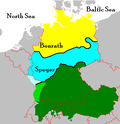 | High German consonant shift (redirect from High Germanic) or second Germanic consonant shift is a phonological development (sound change) that took place in the southern parts of the West Germanic dialect continuum... 60 KB (6,422 words) - 12:28, 15 April 2024 |
The Germanic substrate hypothesis attempts to explain the purportedly distinctive nature of the Germanic languages within the context of the Indo-European... 14 KB (1,707 words) - 13:34, 8 April 2024 |
Runic inscriptions (category Early Germanic literature) two main geographical categories, North Germanic (Scandinavian, c. 267 items) and Continental or South Germanic ("German" and Gothic, c. 81 items). These... 22 KB (2,639 words) - 05:27, 4 February 2024 |
Germanic toponyms are the names given to places by Germanic peoples and tribes. Besides areas with current speakers of Germanic languages, many regions... 45 KB (2,315 words) - 12:28, 15 April 2024 |
Limes Germanicus (redirect from Germanic Limes) The Limes Germanicus (Latin for Germanic frontier), or 'Germanic Limes', is the name given in modern times to a line of frontier (limes) fortifications... 18 KB (1,984 words) - 16:59, 15 February 2024 |
 | Runes (redirect from Germanic rune) alphabets known as runic alphabets native to the Germanic peoples. Runes were used to write Germanic languages (with some exceptions) before they adopted... 68 KB (6,930 words) - 17:48, 30 March 2024 |
lithostratigraphic meaning. The Germanic Trias formed in the large Germanic Basin, a basin that covered much of midwestern Europe (including the south of the North Sea... 3 KB (420 words) - 15:09, 22 February 2016 |
 | Indo-European languages (redirect from Indo-Germanic) languages still alive today: Albanian, Armenian, Balto-Slavic, Celtic, Germanic, Hellenic, Indo-Iranian, and Italic; another nine subdivisions are now... 111 KB (10,129 words) - 10:03, 26 April 2024 |
 | Proto-Norse language (redirect from Proto-North Germanic) Proto-North Germanic) was an Indo-European language spoken in Scandinavia that is thought to have evolved as a northern dialect of Proto-Germanic in the first... 22 KB (2,296 words) - 17:27, 17 April 2024 |
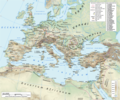 | Burgundians (redirect from Burgundian language (Germanic)) Norse: Burgundar; Old English: Burgendas; Greek: Βούργουνδοι) were an early Germanic tribe or group of tribes. They appeared in the middle Rhine region, near... 33 KB (3,928 words) - 08:13, 30 March 2024 |
 | English language (category Germanic languages) English is a West Germanic language in the Indo-European language family, whose speakers, called Anglophones, originated in early medieval England. The... 229 KB (23,170 words) - 17:10, 27 April 2024 |

